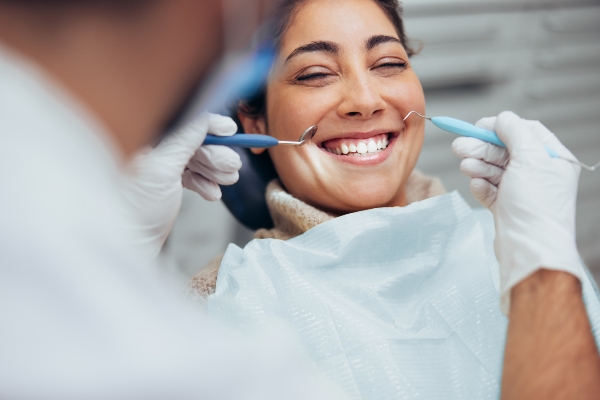What Happens During Your Exam and Dental Teeth Cleaning

Teeth cleaning is not something everyone is excited about. Most people find the noises, prodding, and discomfort unnecessary for dental health. That is why it is easy for them to cancel dental appointments. The dentist will clean your teeth during your dental exam. If you want to know what to expect during a dental exam and teeth cleaning, here are the details.
Physical exam
The dentist will start by inspecting the mouth. A small mirror will guide the dentist around the gums and teeth. This will help spot signs of gingivitis and other dental issues. The dentist will point out the problem areas to the patient before teeth cleaning starts.
Diagnosis
The dentist will ask the patient about tooth sensitivity and pain while inspecting the mouth. Using a probe to look for soft areas can determine the spots for infection. The dentist can also order X-rays to see the extent of decay and infection. After the inspection, the dentist will inform the patient if there are root, surface, pit, or fissure cavities.
Plaque and tartar removal
A small, handheld mirror will guide the dentist while using a scaler to remove sticky plaque and hardened tartar along the gumline and between the teeth. Scraping sounds are normal. The dentist will take more time removing tartar in one particular spot. This could happen if there is a large deposit of tartar on one tooth.
Cleaning with gritty toothpaste
The dentist will use a turbo-powered electric toothbrush and gritty toothpaste to clean the patient’s teeth. The process will involve a loud grinding sound. It may seem intimidating, but this is an efficient way to remove the remaining plaque and tartar from the scaling treatment earlier. The gritty toothpaste tastes and feels like normal toothpaste. The patient could even choose the flavor of gritty toothpaste.
Professional flossing
Flossing happens once daily, but the efficiency depends on the person’s skills. The dentist will provide the patient with professional flossing. The dentist can go deep into the patient’s mouth and see any trouble spots. These areas often cause gum bleeding. The dentist can remove leftover plaque and toothpaste from the dental brushing earlier.
Thorough rinsing
The patient will rinse out the mouth of any dislodged debris as part of teeth cleaning. Doing this a few times will leave the tooth spotless. The dentist will ask the patient to rinse with liquid fluoride as well. This will leave the mouth with a thin coating of protection around the mouth and gums.
Fluoride treatment
This is the final step of the dental exam and teeth cleaning. The dentist will apply a protectant. This will shield the teeth against cavity formation for months. The patient could choose the flavor of the fluoride paste or gel.
The dentist will place the fluoride gel or paste in a dental tray. Biting into it will allow the fluoride to stay on the teeth for one minute. Painting the fluoride onto the teeth is another way of applying it to teeth. The fluoride will harden once it touches the saliva. The patient will be able to eat or drink right after the treatment.
Possible dental restorations
The dentist may recommend some dental treatments after the dental inspection. Filling cavities may come right away. The dentist must perform this treatment to prevent the cavities from worsening. Tooth extraction may happen if the dentist cannot repair at least one tooth anymore. The dentist will remove the decaying teeth. Doing so will prevent the spread of infection.
The dentist can recommend root canal treatment when the dental damage has reached the pulp. This procedure aims to keep the dental structure intact. The dentist will clean out the infected tooth and disinfect the inner chamber. Filling it with gutta-percha will come next. Protecting the tooth with a custom-fit crown can prevent future damage and infection.
Sometimes, the dentist may recommend a dental crown to support teeth with large fillings. These teeth have little healthy dental structure left. A crown can cover the exposed part. The dentist will cement the crown and dry it with a curing light. This will keep the tooth intact for a long time.
Having regular professional teeth cleaning sessions can elevate your dental health
Seeing your dentist for regular dental exams and teeth cleanings can improve your oral health. Personal oral care could only go so far. You need your dentists to remove tartar and excess food particles. A teeth cleaning session is not painless at all. Starting regular dental cleanings can prevent many dental issues, including tooth loss.
Are you considering having teeth cleaning in the Culver City area? Get more information at https://www.culvercitydental.com.
Check out what others are saying about our dental services on Yelp: Teeth Cleaning in Culver City, CA.
Recent Posts
It is a known fact that routine dental cleaning is an important part of oral health. The American Dental Association recommends that people with an overall healthy mouth visit a dentist for a regular checkup and cleaning once every six months. Those with specific dental issues or certain underlying health conditions may need to schedule…
Even though regular dental cleanings are important for oral health, many people fail to prioritize them. A recent National Health Interview Survey revealed that more than 30% of American adults have not had a dental checkup in over one year, even though the American Dental Association recommends seeing a dentist at least once every six…
A dental cleaning is a vital part of good oral hygiene. It is a preventative treatment that involves the dentist removing tartar and plaque from teeth surfaces. It is performed using a metal tool known as a scaler. Dentists recommend getting teeth cleaned at least two times each year, as it goes a long way…
Looking for dental cleaning information, specifically on oral health issues that regular dental cleanings can help prevent? If you are wondering just how important regular dental cleanings are when it comes to your overall oral health, know that they are extremely important.Even when you brush your teeth using a soft-bristled toothbrush at least twice a…


